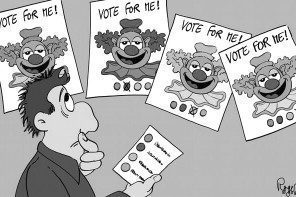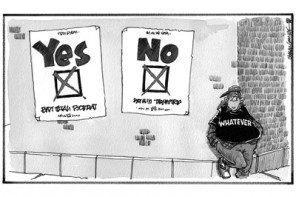And thus the American people have spoken. After a long and painful election season, filled with misogyny, racism, fake news and Vladimir Putin, Donald Trump is now the President-elect and the uncharismatic yet highly (in fact, over -) qualified Hillary Clinton has been defeated. America had a chance to prove its moral authority to the world, to show that women could truly break every last glass ceiling in existence and to send the demons of xenophobia into the abyss, never to return again (well, one can hope) and for some reason, America wanted none of it. Well, at least, America’s electoral college wanted none of it. The people of the United States, in fact, overwhelmingly voted for Hillary Clinton, by roughly a million votes at the time of writing, bigger than the winning margins for John Kennedy and Richard Nixon and second only to Barack Obama. But, because of a plurality of antiquated systems (sexism, racism, the electoral college, oh my!), an orange-faced blowhard with zero experience and hateful rhetoric now holds the office of highest power in America and, arguably, the world. (For an explanation of the U.S. electoral college, please click here).
At many points throughout the election season, Donald Trump whined that the media were “rigged” against him. In this frightening new world, being asked to explain a policy position is, apparently, adversarial. Now, as President-elect, Trump has already ditched the press to eat steak with his family and Megyn Kelly, a journalist on TV channel Fox News, has written in her memoir that she received death threats throughout the election season after deigning to question Trump on multiple sexist remarks he made. In fact, when Trump simply didn’t like how the media were responding to him – dear reader, they were responding in normal, media-like ways – he threw temper tantrums and called “conspiracy.” Meanwhile, it has been revealed that Russians and Macedonians thwarted the results of the election by creating fake news and phony social media accounts. WikiLeaks also played an astounding role, hacking the email accounts of Democratic party players and posting them online for the world to read. Without context, the emails appeared to show a dark and unsavory side of the Democratic political machine. However, most mainstream media dismissed the emails out of hand. According to The Atlantic, “Though anti-Clintonites on the right and left may find their suspicions about Clinton confirmed, there’s nothing in the emails that would provide them new lines of criticism—or provide new sources of worry to her allies.” Trump railed against the media, saying they were “against” him, instilling distrust in the Fourth Estate and a distrust for viewpoints that were not his own. This created, in turn a growing reliance on fake news, a phenomena only now being addressed by Facebook and Google.
While we’re on the topic of social media responding “too little, too late”, let us now also discuss Twitter, who, a week after the election, decided to shut down some accounts associated with the “alt-right”, a loosely organized movement that has been associated with white nationalism. That these accounts had any attention given to them at all is indicative of the powerful role that race played this election- go -round. Although arguments can be made that anti-immigrant/refugee/nonwhite sentiment was already kicking around in the great Melting Pot before the rise of Trump , the President-Elect certainly enflamed those sentiments. With claims that Mexicans are rapists, that President Obama was not born in the U.S. and more , Trump capitalized on white fears about the future of their country and their culture. The U.S. is now more racially and ethnically diverse and projected to be even more diverse in the coming decades. Furthermore, Millennials – young adults born after 1980 – are the most racially diverse generation in American history: 43% of Millennial adults are non-white, the highest share of any generation. Whites, however, are still the majority and they voted overwhelmingly for Trump. Even white women seemed not to care about the barrage of insults and misogyny throughout the campaign season and voted to let Trump grab the entire country by the pu$$y.
Nonwhite women, however, voted overwhelmingly against Trump. 94% of black women voted for Hillary Clinton and 68% of latino women voted for her as well. Perhaps white women’s support of Donald Trump is similar (though also exceedingly different) to black women’s support of Martin Luther King Jr.: Though he was sexist, he advanced the race in important ways. Granted, black people were living in abject fear for their lives at the time of MLK and white women today, though possibly economically depressed, are hardly fearing bodily harm at a societal level (unless you count the denial of abortion).
Right. So let’s really talk gender now. Hillary Clinton was the first woman ever to be the presidential nominee of a major political party in the United States. She had already served as First Lady of Arkansas, First Lady of the U.S., Senator of New York state for eight years and Secretary of State for four. She simply oozed experience. But many people disliked this aspect of her candidacy. This is a time when populism and being an outsider (don’t worry – the irony of a straight, white, male billionaire being “anti-establishment” is not lost on me, dear reader) is important to so many Americans, because of their supposed economic woes brought on by a political system that has failed them. Hillary Clinton, it seems, represented this system to many Americans because she is a longtime fixture of theestablishment, she was making no promises to upend it and she has benefitted from it. Donald Trump, however, was born exceedingly wealthy (silver spoon and all), has, even now, not released his tax returns and declared himself “smart” for not paying federal taxes for many years. Neither candidate is particularly “anti-establishment”. But Trump, with all of his rich, straight, white, male privilege, was able to talk (read: lie) his way into voter’s hearts. His 1987 book, The Art of the Deal, reveals how to manipulate people, “I play to people’s fantasies. People may not always think big themselves, but they can still get very excited by those who do. That’s why a little hyperbole never hurts. People want to believe that something is the biggest and the greatest and the most spectacular.” Unfortunately, many Americans wanted to believe Trump’s biggest, most spectacular lies and have now elected him President. Hillary Clinton, as a woman, simply did not have that certain “je ne sais quoi” (maleness) people were desperately seeking.
Now, let’s not forget that niggling email server and Benghazi. (We’ll always have Benghazi.) Hillary Clinton was raked over the Republican coals for her use of a private email server while Secretary of State even though the FBI, after a long, ridiculous, waste-of-taxpayer-money investigation revealed nothing criminal, just carelessness. FBI interviews released in September “depict less a sinister and carefully calculated effort to avoid transparency than a busy and uninterested executive who shows little comfort with even the basics of technology, working with a small, harried inner circle of aides inside a bureaucracy where the IT and classification systems haven’t caught up with how business is conducted in the digital age.” In other words, “the emails” was just a trumped-up charge of misdoing whose investigation was politically motivated and wasted precious public funds. All carried out by the (Republican) party that fights for “less government” and “fiscal conservatism.” As for Benghazi, when an attack in a U.S. embassy in Libya in 2012 led to the tragic loss of American ambassador Chris Stevens, former Secretary of State Colin Powell, called the investigation into Benghazi “a stupid witch hunt” and Condoleeza Rice, also a former Secretary of State, agreed. Both served under the George W. Bush administration. In another message, Powell denounced Trump as a “national disgrace and an international pariah.”
Unsurprisingly, in the media arena, Trump received almost no endorsements. Of the 100 top circulation print newspapers, only 2 endorsed him. However, more than 200 newspapers supported Clinton, while Trump received the backing of fewer than 20. For the first time in its 148 year history, the San Diego Union Tribune endorsed a Democratic candidate. The Arizona Republic backed Clinton as well, for the first time in their 126-year history. Trump did receive 2 major newspaper endorsements, half the amount that Libertarian candidate Gary Johnson received. 26 major newspapers did not endorse a candidate at all, exemplifying the deep disapproval the country felt for both Clinton and Trump.
And so, after all of this racism, misogyny, misinformation, manipulation, investigations (which went nowhere) and expert backlash (against Trump), the American people, or rather, the American electoral college, chose Trump, the muckiest of the muck. The dirtiest of the dirty. Clinton wasn’t perfect – a “flawed” candidate as many like to say (Have you ever seen a perfect candidate? Me either.) – but Trump was worse. And yet, this article I’m writing reveals that muck now holds the highest office in the U.S. How has this happened? All the experts said Clinton would win. Trump’s chances of winning were beyond slim. How can this be? An “economically depressed middle class that was tired of not being heard” narrative has been present throughout the election season. However, a cursory look at the socioeconomic status of Trump supporters reveals that they’re pretty bloody wealthy (as previously noted). Perhaps it really is the death throes of a dwindling white population in the United States. Because while some black and brown voters did go for Trump, the majority voted for Clinton. And the majority of whites, though almost evenly divided, did vote Trump.
If the world had been allowed to vote, Hillary Clinton would undoubtedly be the American President today. She enjoyed broad support internationally while Trump was met with scratched heads and furrowed brows (to say the least). As someone who spent two of the eight George W. Bush years abroad, this feeling is familiar and dreaded. Explaining to my European and Canadian friends that I did not vote for Trump nor would I ever…that I also don’t understand my fellow Americans who seem to favor “charisma” over intelligence, ineptitude over experience. I know the effect the American President has on the world and this is why I voted twice for Obama and now for Hillary. I cannot even begin to imagine the loss of moral authority my country will, once again, experience, thanks to yet another Republican buffoon. How will I, as a practitioner of international affairs and development, be able to engage in programs to promote gender equality abroad when my President openly espouses sexual assault? How will I be able to promote cross-cultural understanding when the leader of my own nation used hateful, racist rhetoric in his rise to power? Will a decrease in understanding and openness in the U.S. lead to a reduction in compassion worldwide? I really don’t know. While I do believe that my country’s elections powerfully impact most nations around the globe, I also believe in the power of every country – and every people – to make decisions for themselves. The changes that I’m interested in seeing in other countries – gender equality, racial equality, religious equality – are always more successful when they start at the grassroots. Local investment means change is real and it will last. So, while I cannot fathom how my country elected this madman, I still believe in the power of people coming together and making this world a better place to be. As Margaret Mead said, “Never doubt that a small group of thoughtful, committed citizens can change the world; indeed, it’s the only thing that ever has.” As I work on issues of international affairs and development, I will remember this quote for my own country as well.
Relevant: RACISM AND US ELECTION 2016
About the Author
The author is an international communications specialist from the USA.






